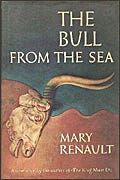The Bull from the Sea concludes the tale of Theseus begun in Mary Renault's The King Must Die. It’s written with the same superb sense of place and time, in the same distinctive voice, but can’t quite match its predecessor. This is due in part to the curse of almost all biographical tales: lives whose first halves include triumph have a way of losing focus as they continue, and very often end unhappily. Renault skillfully integrates the assortment of stories about her hero’s mature years, including his encounter with King Oedipus and a dire, realistic interpretation of his descent into the underworld, but it’s necessarily more episodic and less stirring than the earlier story. However, the centerpiece of the tale was compelling enough to sink the hook too deeply for me to shake off. There Theseus, now Athens’ king, woos, weds and then loses the splendid Amazon who is the great love of his life. Captured by this thrilling action, I read on through the tribulations that followed, including Renault’s reshaping of Euripides’ tragedy about the fate of their son Hippolytus.
The Amazons of The Bull from the Sea are not the full-fledged nation of warrior women ancient Greek historians described dwelling in lands north of the Black Sea, but a band of fierce virgin priestesses, Moon Maids, devoted to the Goddess. They are seen through the eyes of the narrator, a man who loves women (and the creation of an author who loved women) and the traits that make these Amazons attractive are lovingly depicted. Here they are, surprised while taking a swim: “Their thighs were taut and sleek, the legs long and slender; their shallow breasts were as perfect as wine-cups turned on the wheel. All over they were gold with sun, not skewbald from wearing clothes; and on the brown their pale fair hair shone like silver.” They’re pretty fierce too, and their presence ensures that those who share Theseus’ taste for strong women should enjoy this book. (1962; 343 pages)





